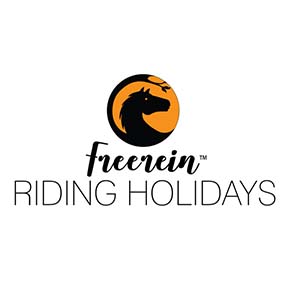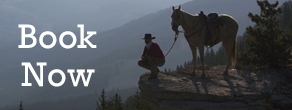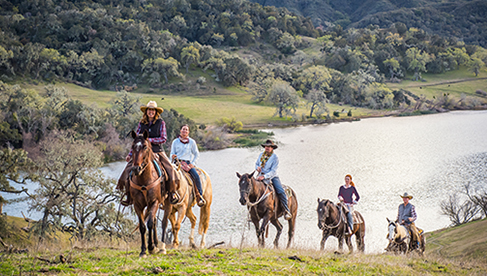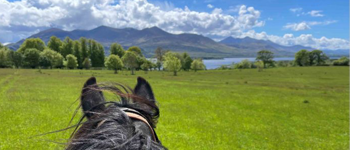Botswana- A Mother - Daughter Horseback Safari












By Georgia Hunter
From Hippos to Hornbills in Botswana's Okavango Delta
Matthew held our hands as we stepped into the wobbly dug out canoe he called a mokoro. I took my perch on a wooden plank at the front, my mother on one in the back. Matthew stood between us holding a long pole. Plunging one end into the muddy bank behind us, he pushed off into the dark lagoon. Water, black as night, swirled around us.
We were quiet. Aside from the plop of the pole every so often in the water, the only sound we could hear was the call of a bird above. “Fish Eagle" Matthew said, matter-of-factly.
Soon the plops were followed by tap taps of the pole on the side of the makoro. I looked back at my mother and then up at Matthew. “For the hippos," he said calmly, scanning the water with dark eyes. Around us, as far as I could tell, there was no sign of hippos. The water lay still as glass. “They don't like it when you get between them and the deep water. That's their safety zone. The tapping scares them away, or brings them to the surface. Then we can move around them."
I looked again back at my mother who sat stiffly now, her fingers creeping out to grip either side of the makoro. Tap, tap. Tap, tap.
With each stroke of Matthew's pole we slipped further into the depth of the lagoon, away from the comfort of solid ground. And now, sure enough, there were ripples up ahead. Little clusters of concentric rings, growing bigger and bigger until they quietly disappeared. Distracted by a small popping sound, I peered over the edge of the makoro and watched as a tiny stream of bubbles made its way to the surface just inches from us. I stared hard into the water, only to see my reflection staring back.
“Look!" Matthew whispered. Across the lagoon on a spit of land, a herd of six giraffes mingled around a grove of trees. In an instant, fatigue from twenty hours of travel and fear of impending death-by-angry-hippo vanished. I stared.
“Wow," I heard my mother whisper. Wow.
The giraffes walked in slow motion on long, knobby legs. Their shoulders sloped down steeply to their hindquarters, their coats a tapestry of rich chestnut and white. They sauntered from tree to tree, nibbling leaves only they could reach.
It's hard to describe the feeling you get when your world revolves around the rise and fall of the sun and the floods that come and go once a year bringing food and water. Where Mother Nature decides your fate. Crisp African air filled my lungs and as I exhaled it dawned on me that we'd come upon an oasis; a little watery wonderland in the middle of what felt like no where.
I was eighteen. My mother and I and our two close friends (another mother-daughter pair), had decided to take a horseback safari on the Okavango Delta in Botswana. We were all crazy about riding. Katya and I met at a stable where we took lessons and just as we became instant friends, our mothers did as well. Wendy was a great rider, and had a mare she would take out on trail rides while Katya and I were in our lessons. Mom grew up riding as a child. All four of us had fantasized for years about going on a riding safari, and when Katya graduated from college and my mother picked up riding again, we didn't think twice about acting on our dream.
So here we were; a day after taking off from Boston's Logan airport, having traveled by air (four plane rides), by land (via LandRover) and now by water (in our makoros), about to reach Camp Macatoo; the place we'd call home for the next week. I say we were about to reach Camp; the truth was, we saw no sign of human life. Just giraffes. And now that the bubbles had vanished, dark, eerily glassy water.
“Are you sure this place even exists?" I whispered to my mother.
“I'm sure we're close," she offered, but I could sense the doubt in her voice. Mom, designated chief organizer of the trip, had found Camp Macatoo off an Internet search for “African horseback safaris." Today, she'll admit there were a few minutes in the makoro when she wondered whether the whole thing was a hoax and we'd find ourselves left on the edge of the lagoon with the food chain to decide our fate.
A few minutes later, however, we rounded a bend and heard voices. As the makoro touched shore, we were greeted by a staff of six, clapping and singing a welcome song. A stocky gray dog, Tigger, ran sprints along the sandy shoreline, yapping as if to say “Finally! You're here!" As a very dark and friendly African named Bazuka helped us out of our mokoros, I knew instantly we were in good hands.
Although the Camp held eight, we were the only four guests so we had the place to ourselves. After several warm handshakes, Bazuka showed us to our tents, spacious enough to walk around in and equipped with two comfy single beds, two small shelves and a basket for dirty laundry. My mother and I poked around behind our tent where there was a stand holding two pretty ceramic washbowls and a pitcher of water. Next to it stood our shower; a bucket of water warming in the sun, attached to a hose and perched on top of a small wooden enclave.
“You're going to have to keep your showers short and sweet, hon," my mother said, eyeing the bucket. The toilet was a short distance away; a deep drop loo surrounded by canvas.
Lunch awaited us at a table looking out over the lagoon. We helped ourselves to a buffet of cold meats, salads, cheeses and fruit and were joined by John, a British expatriate, who would lead our rides. He was short but rugged, had a lovely accent, broad shoulders and tan, leathered skin (yes, I immediately had a crush). Between bites of black-eyed peas, John told us about the bush surrounding us and a few of the animals (some friendly, some not) we shared Camp with. There were the baboons, who enjoyed startling us by screeching loudly as we walked under the trees in which they were perched, the elephants who plodded silently through camp every now and then and the hippos, of course, who lazed around in the water, eating up to 150 pounds of grass a day. The latest excitement was that a cheetah's footprints (called “spore" in the bush) had been spotted on multiple occasions throughout Camp.
For safety's sake, we were warned never to walk beyond the immediate grounds without one of the guides, who were all equipped with first aid, a rifle and a radio. On rides, they also carried a GPS so if any of us got hurt we wouldn't be stranded. John's final tip was to bang on the walls before entering the bathrooms and showers, as “you never knew what might be in there." Mom and I later vowed we'd make midnight trips to the loo in tandem.
Shortly after lunch, we changed into our britches and headed out to meet our horses and go for a “sundowner" ride.
I was paired with a lively gray Arabian, Ali Baba. John told me he liked to be up at the front of the group and could be “a handful." I winked at my mother, knowing that weeks before when she'd sent in the forms detailing our riding levels, she'd rated me as an “expert," fearing I'd get stuck with a horse that was “too easy." She knows me well; I like horses on the challenging side. I was excited to see what Ali Baba had to offer.
My mother's horse was a little chestnut stallion named Herero, a.k.a. “Scar Butt." He wore an eight-inch half moon welt on his haunches from a lion attack the year before; a silent reminder to all of us that even on horseback, there were still others in the kingdom well above us in the food chain. Mom was surprised to find herself on a stallion, let alone one who'd survived the wrath of a lion. “Do you think I'll be okay on him?" she whispered. Horses were one of the only things at that point in my life my mother turned to me for advice on.
I nodded “Definitely. He looks nice and relaxed. Just take your time getting to know him, start off slow, think about keeping your heels down and the rest will fall in place. You'll be fine." I tried to sound confident. Mom pushed her heels down into her stirrups.
Katya was paired with a big, black ex-racehorse named Mulapo, African for “floodplain," and Wendy with a patient looking bay gelding named Oliver. We all got situated, checked our girths and adjusted our stirrups, and then we were off.
We walked slowly away from Camp and found ourselves along the edge of a smaller, much more inviting lagoon than the one we'd crossed in our makoros. Pods of paper white water lilies peppered the water's surface, a glittery reflection of deep blue sky. Jacana Birds (a.k.a “lily trotters") floated comfortably on their respective lily pads, while Fish Eagles and Open-Billed Storks competed for bream and catfish.
After a few hundred yards, John threw up his hand and we stopped abruptly. Squinting into deep brush, I strained to see what he saw. Finally, there was movement and the silhouette of a giant head took shape. Peering at us from the shadows was an elephant. It was massive! We sat motionless, awaiting a signal from John. We'd learned earlier that although they appear docile, elephants will charge if they feel threatened. John held up two fingers and a second elephant sauntered into view. None of us moved a muscle. Time came to a standstill and we sat staring as the prehistoric-looking animals flapped their ears, staring back, unblinking.
Finally, John raised his hand again and motioned for us to follow. Without a word, we crept past the two enormous creatures, breaking into a trot once we were out of danger. Mom trotted up next to me. “That was incredible!" she said.
“I know! Did you see how big their feet were? They were like garbage cans!
We slowed to a walk and splashed through shallow water, then onto a dry, grassy plain spotted with unfamiliar bushes and termite mounds the size of people. Impala bounded effortlessly in and out of the tall yellow grass like dolphins leaping out of water while herds of tsessebes and wildebeest trotted alongside one another; a mass of brown, steadily making its way to the next watering hole.
We rode on and came across a herd of zebra who'd smelled us coming long before we saw them. There must have been thirty, all in a perfect row, stripes aligned, staring at us as we approached. When they decided we were close enough, they flared their nostrils, turned, and in perfect unison, cantered off in a thundering cloud of dust. We headed back to Camp as a bright red sun sank slowly into the horizon. Our shower buckets were filled to the brim with hot water. Mom and I banged on the walls and peered into the enclave to check for visitors. The coast was clear. Promising not to take longer than a few minutes, I rinsed off first, letting the hot water trickle over my cool skin.
We dressed warmly for dinner, which began with cocktails around a small campfire. Matthew passed around a plate of hors d'oevres; delicately spiced kebabs on tiny wooden skewers, which we tossed into the fire when we were through. We ate at a table in the sand behind the campfire, set elegantly with wine glasses and creatively folded napkins, lit only with candles. Sonny, our waitress, announced the evening's meal in broken English, giggling along the way: carrot soup, marinated flank steak and freshly baked bread. Just as we noticed a chill in the air, Matthew brought a shovel full of burning embers from the campfire and placed a few under each of our chairs, keeping us warm throughout the meal.
On full bellies, we flopped into bed. Mom and I scribbled all of the day's sightings into our journals, then fell asleep to an orchestra of unfamiliar sounds. We woke up early the next morning, toasty under thick blankets. Despite the crisp, dewy air, we hopped eagerly out of bed. I threw on riding pants and bundled up, peering out our tent door over the mist-covered lagoon. Baboons scampered down from their trees, several with baby in tow. I wondered what animals had crept past our tent as we were sleeping.
Looking for spore around the tent every morning became a favorite ritual for me and my mother, when we'd find fresh prints, we'd tip toe around them and bring John back after breakfast to tell us who they belonged to.
John had built a new fire. We helped ourselves to hot oatmeal, fruit, toast and yogurt and sipped potent African Red Bush tea called Rooibus. Strapping on fanny packs with sunscreen, cameras and sunglasses, we walked down to the stable and climbed atop our mounts who were tacked up and ready to go.
With John again at the lead, we took off for our first full day of riding, following wildebeest and zebra paths to a gleaming blue watering hole. We watched patiently as red lechwe approached tentatively for a drink, keeping one eye, always, on the crocodiles sunning on the opposite bank. We walked on and came to the edge of a shallow lagoon the size of a football field where John asked if we were up for a run through the water. “Hold on tight,"Â� he said, “it'll feel funny at first. And stick together, it'll scare away the crocs.Â� We took off, grabbing mane and gripping with our thighs, bounding in rocking-horse motion through cold, knee-deep water that splashed our legs and left us breathless when we finally reached the far bank.
When hunger kicked in mid-day, we pulled up for lunch in the shade of an ancient Boabab tree and spread out a blanket and a small feast John had somehow fit in his saddlebag. We tied the horses to branches, loosened their girths, unclipped their bits and let them graze while we gathered twigs and boiled a pot of floodwater for coffee over a small campfire.
Climbing back into our saddles, appetites quenched, we stripped down to tank tops, thankful for wide brimmed cowboy hats shading our faces from the hot afternoon sun. We set off on a winding route back towards Camp, running into a pack of wild dogs, rarely seen on the Delta, and a pair of darting warthogs zigzagging about. With the tips of their tails sticking up out of the grass like antennae, they bore a striking resemblance to remote control cars.
Ali Baba and I enjoyed riding up front next to John. I asked countless questions, he fired back answers. He seemed perfectly at home in the bush, and his confidence, keen sense of humor and calm, gentle manner were comforting (as was the rifle he kept by his side at all times). He could identify every footprint left in the sand and could tell us how far away a lion was by the sound of its gutteral call.
Just when we thought we'd exhausted our game sightings for the day, we noticed six or seven vultures circling over a clearing thirty or so yards ahead. I din't think much of them, except that they looked ugly and mean, their bald, red heads craning downward. Our horses sensed something, though their ears perked up and their nostrils flared. From the sudden hesitation in Ali Baba's step, I knew something wasn't right.
Rounding a bend, we noticed a strange mark in the sand where it looked like something had been dragged. Alongside the drag marks were footprints but they weren't like any we'd seen before. I looked up to ask John what kind they were, but at that moment, all of our horses stopped dead in their tracks and refused to move on. Within a second, John had slipped off his horse, Sherwood, his rifle cocked and aimed. “Lion!" he whispered.
Sure enough, we'd run practically right into a pride of two lionesses and their cubs, feasting on a recent kill. Now we could see the drag marks in the sand were left from a buffalo whose carcass had been pulled to a clearing, just twenty feet away. And between it and us were the lionesses, no longer eating, but approaching us slowly. Their piercing eyes were fixated on us, their jowls furled, exposing sharp, carnivorous incisors. Their muscles quivered under coarse, golden fur standing erect on the backs of their necks. They must have weighed over three hundred pounds.
My heart pounded against my chest and my knuckles turned white from a death grip on my reins. Every muscle in my body froze. A sequence of thoughts raced through my mind: the horses will run. And the lions will chase. And kill. A shiver shot down my spine. I glanced back at my mother. The least experienced of all of us, I was petrified Herero (not having any interest in a second lion encounter) would turn and bolt and my mother's balance and strength on horseback would be put to the ultimate test. I willed Herero to stay calm.
John, eyes fixed on the lionesses, talked to us in a quiet, commanding voice: “Turn around. Walk SLOWLY in the other direction. GO. NOW. And DON'T run. Keep walking until I catch up with you."
I squeezed Ali Baba's side and gently asked him to move. We all turned; I brought up the rear. Seconds stretched by as we walked in silence. To my amazement, Sherwood followed quietly behind. I kept my eyes glued to my mother in front of me. So far so good. John was ten feet behind us, creeping backwards, rifle aimed, finger on the trigger. The lionesses followed and glared, their yellow eyes gleaming in the sun. When we were far enough away, they came to a standstill and finally sauntered back to their cubs, rolling around playfully in the dust beside the buffalo, bellies bulging. With John safely aboard Sherwood we could breathe again. We laughed off the tension by joking about what a “close call" that had been, silently saying prayers of thanks to the African Bush Gods.
Back at camp, we told the rest of the staff about the day's excitement over a well-earned glass of wine by the fire, complimenting John on his bravery. If I'd had a crush before, now I was close to being in love. He was my hero. A hero to all of us that day, I think.
Each day at Macatoo would end the same way, sitting around the fire telling stories, recounting the day's adventures, etching them into our memories. I loved our routine; falling asleep to the sounds of the wild, waking up with the sun to a new day, a new adventure, each different from the last. The best was knowing that once we returned from our sundowner rides and the stories were told, captured in our journals and in our hearts, the next morning it would start all over again, sitting quietly around a small fire, warming our hands around bowls of oatmeal and mugs of Rooibos tea, watching dawn's fog slowly evaporate from the damp earth, the anticipation of what the new day would bring almost too much to bear.
How to get there
All of the major airlines fly to Johannesburg (we flew British Airways from Logan, with a layover in London). From “Joberg" (JNB), as it is often referred to, we flew Air Botswana on a twin-engine to Maun (MUB), where we caught a single-engine four-seater to the middle of the bush, where our “runway" was quite literally a strip of dirt. From here, Macatoo had arranged all of our transportation (although now you can also work with them to coordinate flights from Maun). We were picked up on the runway and driven over sand and through water via LandRover until we reached the edge of a giant lagoon, too deep to drive through. There, two of the staff from Macatoo were waiting for us, each with a makoro; our final mode of transportation that brought us to Camp. Julie Snyder, Equitrekking Travel's Preferred Provider of Travel Services, can book you on this African Safari in Botswana. More information at EquitrekkingTravel.com.
When to go
Typically the Okavango Delta floods once a year when an Angolan river spills over after the rainy season. The floods usually arrive at Camp in May or June and recede in late September/early October, but there have been years that they've come early as well as those when the river hasn't flooded at all. Keep in mind that the seasons in Africa are opposite ours. It's winter there in June, which is often sighted as the best month to visit.
What to bring
Bags are limited to 26 pounds each. Pack lightly in soft bags, and make sure to bring a fleece and one other warm layer for nighttime and early morning. We stripped down to tank tops during the day. Bring at least two pair of riding pants, riding boots with a heel, a wide brim hat with a strap, sunglasses on a string, a bandana and extra socks. We brought fanny packs with sun block, chap stick and bug repellent, which we carried with us on rides. I recommend bringing riding gloves as well. If you're going to bring a camera (which is a MUST), a waterproof bag and strong shoulder strap are essential. You'll also need to consult your doctor before coming and bring malaria pills. Since my trip, Macatoo has built a pool on premise, so bring a bathing suit, sarong, shorts and sandals as well. Macatoo will provide you with half chaps, and when clothes are dirty, they can be left in the tent in the morning and will be clean upon your return.
*Note: Macatoo recommends you wear a lightweight hard hat while on a riding safari. Many insurance companies will not insure you otherwise. However, Macatoo cannot supply hard hats or safety helmets, so they ask that you bring your own.
Riding ability
This trip is for riders. I wouldn't recommend it for someone who doesn't feel comfortable in the saddle. We spent 4-6 hours a day aboard our mounts, and there was a good amount of trotting and cantering through water and over plains. We were also aware that there was always a chance we could be forced to gallop out of danger. For all of these reasons, Macatoo doesn't accept beginners. You must be a confident rider, able to keep up and control your mount at all paces. Age limit is 16 and over, and it's recommended that riders over 60 be fit and strong. Weight limit is 210 pounds.
Horses and Tack
Mounts are Thoroughbreds, Namibian Hanovarians, Arabs and Kalahari-Arabs crosses, ranging from 14 - 16.2 hands. There are good quality English and Western style trail saddles, each with their own water bottle.
Book a 5, 7, or 10 day riding vacations in the Botswana Okavango Delta at EquitrekkingTravel.com




